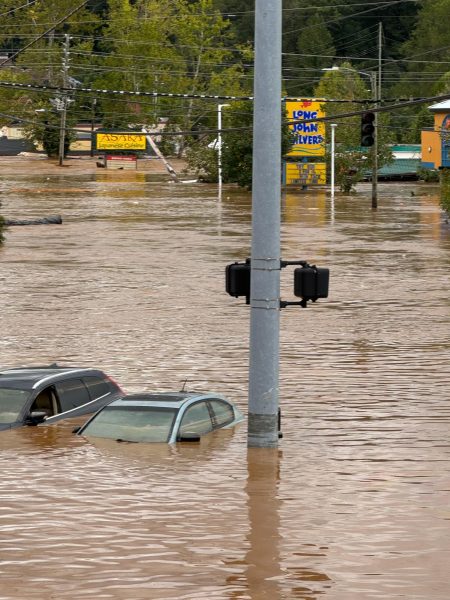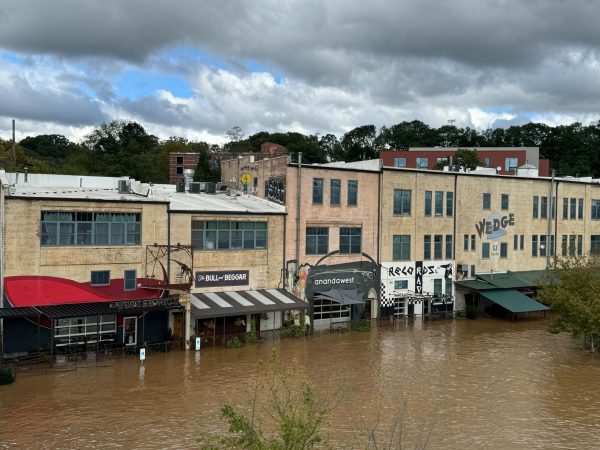Down in the hollers and valleys of the southern Appalachians, thousands of people are underwater.
Days before Hurricane Helene made landfall in the southeast, Florida, Georgia, South Carolina, and western North Carolina were under tropical storm warnings. Meteorologists anticipated a fast and unrelenting storm that would devastate areas even hundreds of miles inland, a rarity for hurricanes.
But meteorologists‚Äô worst predictions of the storm proved conservative. Hurricane Helene reached wind gusts of up to 110 mph and produced up to 31.33 inches of rain in North Carolina over the course of the storm. In the mountain towns of upstate South Carolina, eastern Tennessee, and western North Carolina, tree damage destroyed homes and made travel impossible. Buildings were underwater in a matter of hours, and survivors hailing for aid on roofs mimicked the sights of Hurricane Katrina in 2005.¬Ý
Most cities situated in the lower regions of the Appalachian Mountains are basins for collecting rainfall. If the roads weren‚Äôt blocked by uprooted trees, they were swept away in floods or underwater. In South Carolina alone, aging infrastructure was the first to go; several small towns still remain cut off from the outside world because paper-thin bridges crumbled against the stormwater.¬Ý
Hurricane Helene death toll continues to rise
Hundreds of people remain unaccounted for after the storm, either buried under the floodwaters or unable to communicate with the outside world. Death tolls are only expected to increase, with CNN reporting 162 dead across the six southeastern states that were hit as of Oct. 1.¬Ý

Hard-to-track hurricanes can make evacuations difficult
In an era of unprecedented and ever-changing hurricanes, frequent evacuation is costly, and on occasion, unnecessary. As hurricanes intensify both in speed and size, paths are erratic and hard to track.
The financial burden of evacuation is an impossible cost to a significant number of people living in the hurricane path, where poverty rates exceed the national average by up to 8%. Aid comes after disaster hits, not before.¬Ý
‘The damage is catastrophic’
Andrew Price, a junior atmospheric science major at the University of North Carolina at Asheville, was stranded on campus for 48 hours with little communication from the university.¬Ý
‚Äú[Students] were not prepared for losing cell service, water, sewage, or any access to the outside world,‚Äù Price said in an interview with The Beacon.¬Ý

When Helene made landfall in Florida on Wednesday, the National Weather Service issued a tropical storm warning for Buncombe County and released several statements addressing the magnitude of the storm.¬Ý
One alert from Wednesday at 3:56 p.m., read: “Many structures may become uninhabitable and some structures may become completely destroyed due to ruinous flooding. Rainfall and resultant flooding has the potential to be a once-in-a-lifetime event. Flooding may reach some areas that have not seen flooding in at least 20 years.”
![]()
A now-deleted Instagram statement from UNC Asheville came later that evening, announcing classes for the following two days would be taught remotely, and the school would be moving to ‚Äúreduced operations status (Condition 1).‚Äù A Condition 1 event is categorized as conditions that ‚Äúmay not pose severe safety risks or logistical challenges, but an event has significant potential tonegatively affect local area commuting, important campus services, or the efficient functioning of campus buildings and grounds,‚Äù according to the University of North Carolina‚Äôs website.¬Ý
Price said that by the time the first statement from the school was made, roads were already damaged or inaccessible from flooding. Several students like Price were stranded, unprepared for the level of destruction, and unable to evacuate in time. At 8:31 a.m. on Thursday, UNC Asheville canceled classes and moved to a Condition 2 operations status.¬Ý
‚ÄúThe damage is catastrophic,‚Äù Price said. ‚ÄúFrom Thursday night to Saturday night, I had zero contact with the outside world. There‚Äôs still people I haven’t heard from or know if they‚Äôre even alive, because there‚Äôs no communication coming in [or] out [of Asheville].‚Äù
Immediate rescue, mutual aid, and cleanup efforts will likely take weeks, with more people dying from lack of food and water. Entire towns and downtown areas, like Asheville, were wiped off the map. Rebuilding is likely to take years and billions of dollars, according to AccuWeather.¬Ý
![]() “I watched entire warehouses and homes [collapse],” Price said. “I watched cars drive into shallow water, and be swept into rapids that covered roofs within seconds.”
“I watched entire warehouses and homes [collapse],” Price said. “I watched cars drive into shallow water, and be swept into rapids that covered roofs within seconds.”
Federal disaster funds have been a precarious battleground in Congress, especially after Hurricane Francine drained a significant portion of it, and additional funds failed to pass. As of Wednesday, Oct. 2, most victims of Helene have yet to see Federal or State funds.
FEMA announced a $9 billion shortfall on disaster relief funds on Sept. 26, the same day Helene made landfall in Florida.¬Ý
As state and federal aid hangs in the balance, community members are stepping in
Firestorm Books, located in Asheville, said in an Instagram post Monday, “No state or federal aid has yet reached Asheville, but all around us we’re seeing regular people acting autonomously to address immediate needs and meet one another with care.”
Several small businesses and grassroots organizations like Firestorm Books are leading relief efforts, providing food and water to survivors. Activists in the Appalachian region feel a distinct responsibility to both bring aid to their communities and advocate that they deserve it.¬Ý
The southeast and Appalachian states have a long-standing history of gerrymandering that still exists. Progressive legislation attacking climate change and improving infrastructure often gets struck down in state legislatures.¬Ý
@RaffeyeEl on X shared photos and testimony of police officers in Black Mountain, N.C., blocking entrance doors to a local Ingles grocery store, the only large grocery chain in the town. Shoppers arrived at the store and were turned away, the user said, because point of service systems were down and purchases could not be made.¬Ý
The same user shared that several people stayed in the parking lot for hours hoping to access the food, water, and medicine inside the store.¬Ý They reported receiving emergency supplies from a friend two days later.¬Ý
The Codfather, a Charleston-based seafood restaurant, collected several truck-fulls of food, water, sanitary goods, and medicine to deliver to multiple cities in North Carolina affected by the storm. In a Sunday Facebook Post, owner Adam Randall wrote that they were the first aid to reach the town of Hendersonville, NC.¬Ý
Helene increases calls for action against climate crisis
Tampa Mayor Jane Castor told CNN, “I don’t know that anyone can deny the effects of climate change on the sheer power of the storms we’re seeing now. And the quickness of them: We had three days, and we were hit by Helene.”
Advocacy groups are holding elected officials accountable for the climate crisis in response to Helene‚Äôs destruction. Sunrise Movement, a grassroots organization advocating to end the climate crisis, had members in Florida supplying food, while others went to New York to protest at Tuesday‚Äôs vice presidential debate.¬Ý
Sunrise Movement protesters organized a sit-in at CBS headquarters in NYC holding signs that read, “Big Oil Caused Hurricane Helene.”
In a tweet Sunday afternoon, the organization said: “When Hurricane Helene hit, Sunrisers in Florida jumped into action organizing mutual aid. We’re proud, but this isn’t a ‘feel good’ story: We shouldn’t have to do this. Our government should be caring for our communities, and Big Oil should pay for it.”
Southern hospitality always seems to find its way to the forefront of disasters, with communities rallying together their time, manpower, and funds to rebuild again. Local and national organizations have come up with ways to help victims. Dozens of individual campaigns, food drives, and other relief efforts can also be accessed online. Here are resources to help those affected.
- Charlotte Mutual Aid offers a resource landing page
- Mutual Aid Disaster Relief is running a donation campaign via Action Network
- Raleigh United Mutual Aid Hub has several resources to donate and help
- Appalachian Voices offers resources for North Carolina and Tennessee